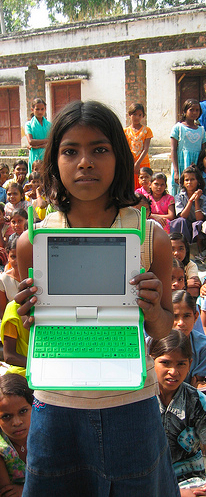I haven't ever been directly involved with the OLPC program, although I have followed it for a number of years, and I think the conclusion of OLPC: How Not to Run a Laptop Program by Mark Warschauer is rather harsh. OLPC taught us a number of good lessons.
Prior to the OLPC effort, netbooks did not exist, and it was hard to find a capable laptop under $700 or so. Today, we have a number of capable netbooks for $200 - $300. Prior to OLPC, business wisdom would have suggested that educators should educate and leave product design to business.
OLPC had the courage to dream, and to innovate, and in doing so inspired a whole category of low-cost computers. If distributing tens of millions of low-cost computers to children was the aim of OLPC, then the program has already been successful in that it inspired major manufacturers to create netbooks.
I bought my daughter has a netbook and loves it. And while she most certainly plays games on the thing, she also uses it as a learning resource. An added bonus is that where a full-size laptop would be awfully large in her lap, it's the perfect physical size for a 10 year-old girl.
The OLPC approach is akin to throwing seeds out of a moving truck. Certainly fewer of those seeds will grow than would grow if we carefully tended them. And yet many solutions can be improved by spending more money. Is the "waste" of the OLPC program greater or less than the "waste" associated with paying someone (or several someones) several thousand dollars a month each to roll out a more structured program.
Is it more effective to seed 500 x $200 laptops for $100,000, or is it more effective to seed 250 x $200 laptops and pay someone $50,000 (with benefits) to roll those out as part of a more formal learning program? Or is the optimal approach yet more hands on - perhaps two people working very closely with 25-50 laptops?
My dad was a school principal for many years, and sometimes he'd look at "failed" programs and say, "it's hard to stop a good learner." And yet, the one thing we can guarantee is that even the very best learners will struggle if they lack the tools to succeed. If only 1% of the OLPC laptops are used intensively, but all of those 1% fall into the hands of children who would not otherwise have a computer, and then learn on their own, and dream, and create tons of knowledge for themselves, the program would be beneficial, even if the other 99% had zero impact.
It's interesting that a number of European countries consider internet access to be a basic human right, and yet we argue about whether all children should have computers. I'm not sure that the OLPC approach creates equal outcomes, but it does create somewhat equal opportunities for individuals who, without a computer, might otherwise have much less opportunity.
I guess my main reaction to the article is that it focuses on the shortcomings of the OLPC program, rather than looking at its successes.
My dad wrote a federal grant in the early 1980's (back when PC's were not common in classrooms), that resulted in his school being the first school in the county to have a room full of computers (Commodore PET's)
Although the grant funded a position to work with the computers, the technology was so new in education, that it was a bit like throwing computers at the problem, and this program and a subsequent grant that he wrote for Apple computers had both successes and failures.
A success in his school was in the use typing programs to teach typing, and in the use of math blaster type video games. Another success was a demonstration (contrary to popular wisdom at the time) that even kindergarteners could use computers. However, other expectations resulted in disappointment.
Expectations that the introduction of computers would lead to a rapid rise in computer literacy and/or that teachers would program their computers led to disappointment - computers intended for this purpose tended to become doorstops (with some inspiring successes, such as the MECC program)
Likewise, I think the OLPC program has had some successes, albeit mixed, and we might ask what we could possibly do differently about the OLPC program. Perhaps the answer isn't strictly one laptop per child, but rather a solution in which all children are given the opportunity to have a laptop if they put forth a modest defined effort. The nature and amount of this effort isn't necessarily all that important.
As a high school student, I saw people using Apple II's, and wanted one, but did not immediately have the money required to buy one. In order to acquire one, I raised half the funds, mostly doing odd jobs around the farm at $1 per hour, at which point my grandparents paid the remainder.
And while I wouldn't suggest such a steep barrier to acquisition for others, there is no doubt in my mind that I valued the computer more because I paid for it, and that I pushed myself harder to learn more about computers as a direct result of the effort that I made to acquire one in the first place.
Aaron Leatherwood in the IT department at Ohio University and has experience in information technology consulting in developing countries.
Subscribe to OLPC News updates via RSS Feed, Email, Twitter, or Facebook




best comments i've seen in weeks...
Very interesting thoughts. Having kids work for laptops seems like a great way to identify who would benefit from them the most, in places where they can't afford to give one to every child.